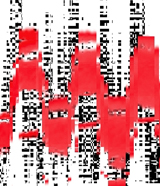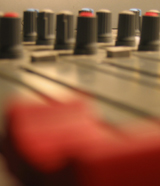Radio_Copernicus
[ Institution ]
Das Projekt Radio_Copernicus wird durchgeführt von der Universität der Künste Berlin, Studiengang „Sound Studies/Experimentelle Klanggestaltung", in Zusammenarbeit mit der Universität Wrocław, Fachbereich Journalismus und Gesellschaftskommunikation. Sende- und Veranstaltungskooperationen bestehen mit dem Festival „garage“ in Stralsund, dem „Warschauer Herbst " und dem Festival „Dis_Positionen", Akademie der Künste Berlin.
Centre for Art and Media Technology, Karlsruhe
The ZKM | Zentrum für Kunst und Medientechnologie Karlsruhe comprises two museums (the Museum of Contemporary Art and the Media Museum) and five research institutes (the Institute for Visual Media, the Institute for Music and Acoustics, the Film Institute, the Institute for Media and Economy, and Institute for Basic Research). This vast pool of knowledge and culture has a seismographic function concerning the development of media and their influence on society. Thus the exhibition “Algorithmic Revolution” deals with the fact that there is no longer any area of social life that has not been permeated by algorithms. The works presented in the Media Museum range from op art, kinetics, arte programmata, fluxus, and happenings to current software art, algorithmic net art, and the most recent explorations of algorithmic literature and music. Every year, spectacular new presentations of works from collections associated with the ZKM alternate with thematic exhibitions at the Museum of Contemporary Art.› visit website
Festival garage, Stralsund
garage is a platform for contemporary art and culture. Established in Stralsund in 1997, the festival shows new approaches in the production, presentation, and discussion of culture and new media, and has earned a serious reputation in this field. garage is primarily a producing festival, i.e., its focus is on the support and production of new, as yet unrealised projects for and during the festival. Here, questions concerning today’s possibilities of art and culture to help shape social development take centre stage.Stralsund is a place away from the large cultural conurbations. Its tranquillity and charming surroundings make it a superb laboratory and field of experimentation for intensive processes of production, work, and exchange on a high artistic and intellectual level. The festival’s attractiveness to many artists, producers, and curators lies furthermore in the closeness to the audience and the opportunity to directly calibrate artistic production with a public that is perhaps less accustomed to new media art.
The festival has become a unique part of the cultural summer in Mecklenburg–Western Pomerania and attracts an international audience. Over the past few years, networking and cooperations with institutions that work in similar ways in European and other international contexts have played a major role in the development of the festival.
Since 1998, garage has been funded by the Ministry of Education of Mecklenburg–Western Pomerania as well as the Hanseatic City of Stralsund and has been supported by various consulates and cultural institutes. For 3 years, the festival has also been funded by the Kulturstiftung des Bundes (German Federal Cultural Foundation).
The festival’s founders and directors are Gesine Pagels and Carsten Stabenow.
› visit website
University of the Arts, Berlin
Studiengang Sound Studies - Akustische KommunikationThe Masters Programme in Sound Studies / Acoustic Communication, which is subject to a tuition fee, is offered for the first time from April 2006 onwards. In four semesters with intensive and personal coaching by mentors, it qualifies students to work with sound in artistic, journalistic, and other creative professions. The broad training enables students to describe, analyse, and evaluate existing sound environments in media, architecture, urban development, and advertising. It also enables them to expertly realise acoustic interventions, modifications, and transformations of such a sound environment in an acoustic conception or a sound briefing. Teaching takes place in four subjects: sound anthropology and sound ecology, experimental sound design, auditory media design, and acoustic conception. Over the four semesters, students specialise in one of these four subjects, in which they also take their examination. The course offerings of the programme were developed and tested from 2002 to 2005 as a pilot project of the BMBF (Federal Ministry of Education and Research).
› visit website
Warsaw Autumn - International Festival of Contemporary Music
“Warsaw Autumn” is the only Polish festival of international status and renown that is dedicated to contemporary serious music. It is where the most recent works from Poland and abroad are performed in the context of notable compositions from the second half of the twentieth century. Through commissioned productions, premieres, and debuts of composers and musicians it creates artistic and cultural artefacts. The festival presents a variety of phenomena and tendencies: from the sonic radicalism in the tradition of Webern, through currents that invoke cultural traditions and ancient music, to audio art, live electronics, and sound installations. The festival’s quality and its history of almost 50 years show that it plays an essential role in shaping Poland’s cultural landscape. It is heavily frequented by the young Warsaw audience and foreign tourists. For the 49th Warsaw Autumn, which will take place from 22 to 30 September 2006, more than 20 concerts as well as numerous workshops and accompanying events are being planned.› visit website
Wrocław University
Katedra Dziennikarstwa i Komunikacji Społecznej funkcjonuje w ramach Wydziału Filologicznego Uniwersytetu Wrocławskiego od 1 stycznia 2002 roku. Prowadzi 3-letnie studia licencjacie. Z dniem 1 października 2005 roku zostały utworzone 2-letnie uzupełniające studia magisterskie. Katedra prowadzi także Podyplomowe Studium Dziennikarstwa i Zarządzania Informacją. Obecnie w Katedrze studiuje 645 studentów. W roku akademickim 2006/2007 Katedra przekształci się w Instytut Dziennikarstwa i Komunikacji Społecznej – trzeci w Polsce, po Warszawie i Krakowie, publiczny tego typu instytut. W Katedrze zatrudnionych jest na stałe siedmiu profesorów i dziesięciu adiunktów. Bezpośrednim przygotowaniem do zawodu zajmują się prowadzący zajęcia praktycy: dziennikarze prasowi, radiowi i telewizyjny, specjaliści od: komunikacji społecznej, promocji i reklamy, podstaw komputerowego redagowania tekstów, nauki o gatunkach dziennikarskich i etyki dziennikarskiej. Katedra posiada również własną serię wydawniczą ,,Nowe media – nowe w mediach”. Od dwóch lat organizuje Międzynarodowy Festiwal Mediów (http://www.mediafestival.pl). W studio radiowym powstaje cykliczny program radiainternetowego pt. ,,Zwrotnica”. Współpraca z Universität der Künste w Berlinie zaowocowała powołaniem do życia artystycznego Radio_Copernicus.
› visit website



